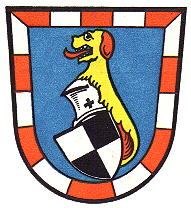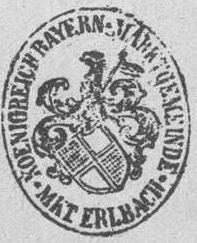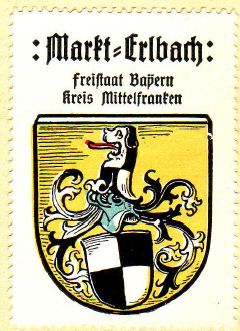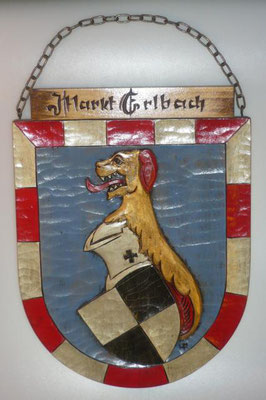Markt Erlbach
MARKT ERLBACH
State : Bayern
District (Kreis) : Neustadt an der Aisch-Bad Windsheim (until 1973 Neustadt an der Aisch)
Additions: 1968 Buchen, Kotzenaurach; 1970 Altselingsbach (partly), Losaurach; 1972 Buchklingen (partly), Eschenbach, Jobstgreuth, Klausaurach, Siedelbach; 1978 Linden
| German | In Blau mit von Rot und Silber gestücktem Schildbord ein gelehnter, von Silber und Schwarz gevierter Schild, darauf ein silberner Kübelhelm; Helmzier ein goldener Brackenkopf mit roter Zunge und rotem Ohr, der unten zu einer goldenen Helmdecke ausgezogen ist. |
| English | blazon wanted |
Origin/meaning
The arms were officially granted on September 24, 1963.
Erlbach historically was a possession of the Margraves of Nürnberg and the oldest seals of the town, known since the 14th century, thus showed the quartered shield with the dog as a crest of the Hohenzollern family, Margraves of Nürnberg. Later the whole composition was placed in a shield, see image below.
These arms remained unchanged until 1963 when the above arms were granted. The reason for the change was that more towns (see Langenzenn) also used the same or similar composition. The bordure is derived from the oldest arms of the Margraves of Nürnberg, before the Hohenzollern dynasty.
Hupp showed in the 1920s the old arms, see below.
| The municipal stamp shown in 1892 |
The arms by Hupp in the Kaffee Hag albums +/- 1925 |
| The arms in the Deutsches Wappenmuseum |
This page is part of the German heraldry portal |
Heraldry of the World |
|
German heraldry:
|
Selected collector's items from Germany:
|
Contact and Support
Partners:
Your logo here ?
Contact us
© since 1995, Heraldry of the World, Ralf Hartemink 
Index of the site
Literature: Stadler, 1964-1971, 8 volumes; Hupp, O: Kaffee Hag albums, 1920s















